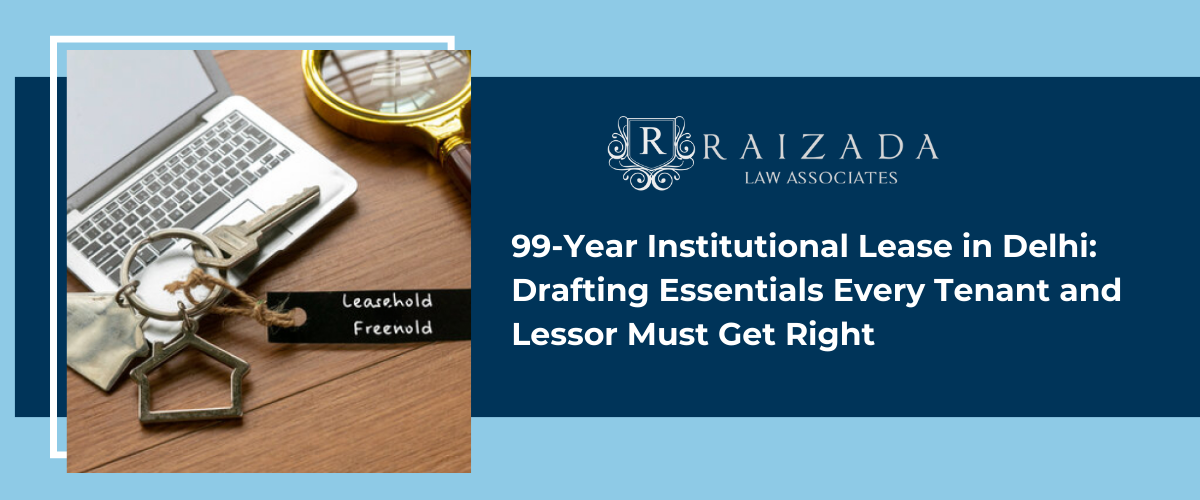The 99-year lease model, over a period of time, has become a standard instrument for institutional land allotments in Delhi, particularly for schools, colleges, hospitals, clubs, and other non-profit or quasi-public institutions. Such leases, often administered by the Land & Development Office (L&DO) or the Delhi Development Authority (DDA), offer long-term possession rights while keeping the ownership with the government.
The 99-year lease in Delhi may look straightforward on paper, but the fine print determines whether the lessee can actually run its institution smoothly, secure financing, or even defend its possession if challenged. Drafting a lease deed in Delhi requires special attention to clauses around use restrictions, re-entry by L&DO, assignment and sub-leasing permissions, and the all-important mortgage NOC requirement.
Specifying Permitted Use To Avoid Breach Notices In The Future
In Delhi, institutional land leased for 99 years almost always comes with some user conditions.
For example, land granted for an educational institution cannot be casually converted into a coaching centre, commercial training hub, or office premises. The lease deed Delhi registration process itself makes “permitted use” a core condition, and any deviation attracts scrutiny from the L&DO.
When drafting the lease deed, it is critical to ensure that the use clause is not left vague or overly restrictive. The lessee should negotiate clarity on ancillary and incidental uses—canteens, staff quarters, hostels, or small kiosks within a school or hospital campus—that may otherwise be challenged as “commercial misuse.”
It is also advisable to build in a mechanism for seeking prior written approval for any modification of use. In practice, L&DO inspections often rely on strict interpretation, and without express drafting, even minor expansions of activity can be branded as violations.
For institutions relying on a 99-year lease in Delhi, a carefully worded use clause is the first safeguard against re-entry threats and breach notices.
Re-Entry Clause Is The Government’s Most Powerful Weapon
Every 99-year lease in Delhi issued by the L&DO or DDA contains a re-entry clause. This is not ornamental—it gives the lessor (the government) the right to resume possession if the lessee breaches the terms of the lease deed. The most common triggers include unauthorized construction, misuse of premises, transfer without permission, or failure to pay ground rent.
The re-entry clause in Delhi leases needs to be negotiated with care. Institutions should avoid formulations that allow for unilateral re-entry without notice. A balanced lease deed should expressly require:
- Written notice of default with a clear description of the breach.
- Reasonable cure periods giving the lessee time to remedy the breach.
- Opportunity of hearing or representation before re-entry is exercised.
Courts in Delhi have repeatedly held that re-entry must follow due process.
Case Update:
In B.S. Ahluwalia & Ors. v. D.D.A. & Ors. (2004) decision, the Court held as follows:
“A lessor has no right to resume possession of a lease by forfeiture or otherwise by forceful dispossession of the lessee. Re-entry by the lessor in terms of the lease can only be in a manner recognized by law and by due process of law, which is by filing a suit for possession.”
This ruling sharply rejects arbitrary or unilateral re-entry and affirms that due process—including proper notice and judicial proceedings—is indispensable.
Assignment and Sub-Leasing
Unlike freehold property, leasehold rights under a 99-year lease in Delhi cannot be freely sold, assigned, or sub-let. The lease deed itself usually prohibits transfer without the prior written consent of the lessor, i.e., L&DO or DDA. Any violation is treated as an “unauthorized transfer” and can trigger penalties or even re-entry proceedings.
When drafting or reviewing the lease deed, Institutions should insist on clarity over:
- What constitutes “assignment”—whether internal restructuring, change in management, or merger is treated as a transfer.
- Conditions for sub-leasing—for example, if portions of a hospital can be given on licence to specialist diagnostic labs or pharmacies.
- Process for obtaining permission—including timelines for lessor approval, and deemed approval if no response is given within a specified period.
In practice, the L&DO tends to exercise rigid control over transfers, often linking permissions to the payment of unearned increase.
The Role of L&DO’s Mortgage NOC in Mortgage and Financing
Whether for constructing new blocks, upgrading facilities, or meeting expansion costs, access to bank finance is important for institutions. But, under a 99-year lease Delhi framework, a lessee cannot mortgage the leasehold rights without obtaining a prior mortgage NOC (No Objection Certificate) from the L&DO.
Banks and financial institutions will not disburse loans unless the NOC is produced, since any mortgage without L&DO’s consent is technically void and exposes the lender to enforcement risks.
From a drafting perspective, the lease deed should contain an explicit clause permitting mortgages of leasehold rights subject to L&DO approval, and ideally setting out:
- Categories of permissible lenders (public sector banks, scheduled banks, housing finance institutions).
- Conditions for NOC issuance, such as payment of dues or compliance with usage norms.
- Timelines for disposal of applications, to prevent financing delays.
Without this clarity, lessees may find themselves caught between lenders demanding enforceable security and the L&DO’s insistence on prior sanction.
Conclusion
A 99-year lease in Delhi offers institutions long-term stability, but the devil lies in the details. A poorly drafted lease deed can expose lessees to penalties, cancellation, or financing hurdles that undermine the very purpose of acquiring the land.
For lessees, the takeaway is clear: do not treat the lease deed Delhi registration as a standard formality. Each clause has operational and financial consequences for decades to come.
For lessors, especially government authorities, careful drafting ensures compliance, prevents misuse, and preserves public interest without inviting prolonged litigation.
In sum, the 99-year institutional lease is the foundation on which Delhi’s schools, hospitals, and other institutions operate for generations. Drafting it with foresight is the only way to balance regulatory control with institutional autonomy.




